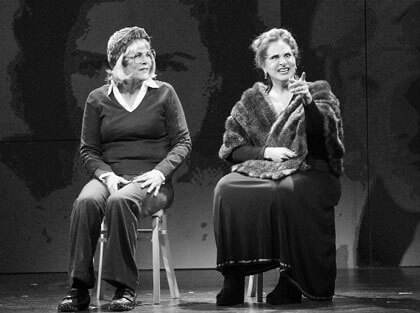Kathy and Mo’s greatest hits dominates Second Stage
When I first saw Kathy Najimy and Mo Gaffney’s first HBO comedy special, I was a budding baby dyke, barely 18. I laughed hilariously at their “Holly and Molly” sketch, two lesbian performance artists spouting lines like, “Oh, golden labia of goddess love, let your champagne flow!”
Then, I went to my first women’s gathering, and laughed even harder, in retrospect. That may be what makes the work of Kathy and Mo so enduring—like the funniest of jokes, it is rooted in truth.
The two stopped performing together in 1991, after Najimy was cast as Sister Mary Patrick in “Sister Act,” and both she and Gaffney agreed to pay their producer to get out of the rest of their run. Najimy has spent the past decade playing roles including Olive on NBC’s “Veronica’s Closet” and the voice of Peggy Hill on the Fox animated hit, “King of the Hill,” and Gaffney has starred in “Mad About You,” That ‘70s Show,” and on BBC’s “Absolutely Fabulous.”
Now, the two are back at Second Stage Theater, with their new revival, “Afterbirth: Kathy and Mo’s Greatest Hits.”
The old bits, wheeled out and spruced up a bit, prove just as funny and fresh the second time around. Both acts of the show open with Najimy and Gaffney as angels, discussing with candor the creation and upkeep of the world. The two perch with angel wings in the top of the “Laugh-In” style picture-box set with windows that open to reveal different set pieces. On the façade, in a splendid display of pink, are the portraits, Andy Warholized, of pioneering women, including Gloria Steinem, Mona Lisa, Josephine Baker, and Amelia Earhart.
Holly and Molly are back, along with their rapt audience, Najimy as Madeleine Samuels, and Gaffney as her friend, Sylvia “Syvvie” Dunlevy, two older women who have returned to school, and enrolled in women’s studies courses. As Maddie says, “We thought, ho ho! We got the prerequisites for that course.” At the end, Maddie tells her women’s studies professor about her gay nephew, Michael, but in this year’s edition, his lover Philip is dying of AIDS. Adding a lover dying of AIDS seems strange given the advances in HIV treatment, but still, as Maddie would say, the piece was hilarious as ever, and “the clips were flying.”
Another old favorite, presaged by hooting from the audience, was the barfly scene, with Najimy as drunken cowboy Hank, cigarette perpetually dangling from lower lip, and Gaffney as endearing, single mom Karen Sue, fending off his advances politely. Najimy elicits howls as she drawls, again and again, “You look very, very pretty tonight… Tell me, sweetmeat, when are you gonna leave that boss man of yours and marry me?”
There are clever new sketches, as well. Take 16-year-old Italian girls, Annette and Gina. Watching their favorite movie, “West Side Story,” Gina sees a parallel to “Romeo and Juliet,” and Annette, to herself, her mother, and her boyfriend, Junior. The two girls create elaborate scenarios, pretending they are Anita and Maria, to test their friendship. Annette finally comes to the truest conclusion: Love hurts, at every level—but also, that “love is thicker than water…”
Another interesting new sketch surfaces in Act two, in the form of the “Disney Mothers Support Group,” a rap session for the much-slighted mothers of Disney animated characters, often killed off in the first 20 minutes of the film. Among those in attendance: facilitator Dolores Deer, mother of Bambi; Cora Clownfish, mother to Nemo; Betty White, mother of Snow; Monique, and the Beast… Latecomer Patty Rella (you do the math) is late after experiencing some difficulty parking her pumpkin, and mistakes the gathering for an AA meeting. Jasmine’s two moms are away at a burqua-burning, and Jumbo, Dumbo’s mother who flew off the handle after yet another kid pulled her baby’s ears, is in attendance with Cruella deVille. (They met in the big house.) The skit takes comic jabs at more serious cultural issues.
Another, more sobering piece, is Gaffney’s anti-abortion protestor, conflicted over her own teenage abortion. Between yelling, “You’ll find your judgment in hell!” to hapless women on their way to ob/gyn appointments, she wonders if she never got rid of little Judy or Jonah, would she have ever left Atlanta, met her husband Bob, and had her other five kids. While she tries to sort it out, fellow parishioner Denny arrives at the clinic, and guns down a pregnant lady.
“She was gonna have that baby,” says Gaffney’s character. “I wish they never invented abortion. It’s caused so much heartache. Still, if I never had that abortion….” The story is furthered at the show’s end, when the character resurfaces as a member of Embryo-Yo!, a group dedicated to educating anti-abortion protestors.
“Afterbirth” wraps on a high note, with all the characters making an appearance onstage simultaneously. The angels pop in, as do Maddie and Syvvie, and we learn that Karen Sue has become a successful country-western star, channeling Patsy Cline. For a show with such a storied history, a happy ending is fitting.


































